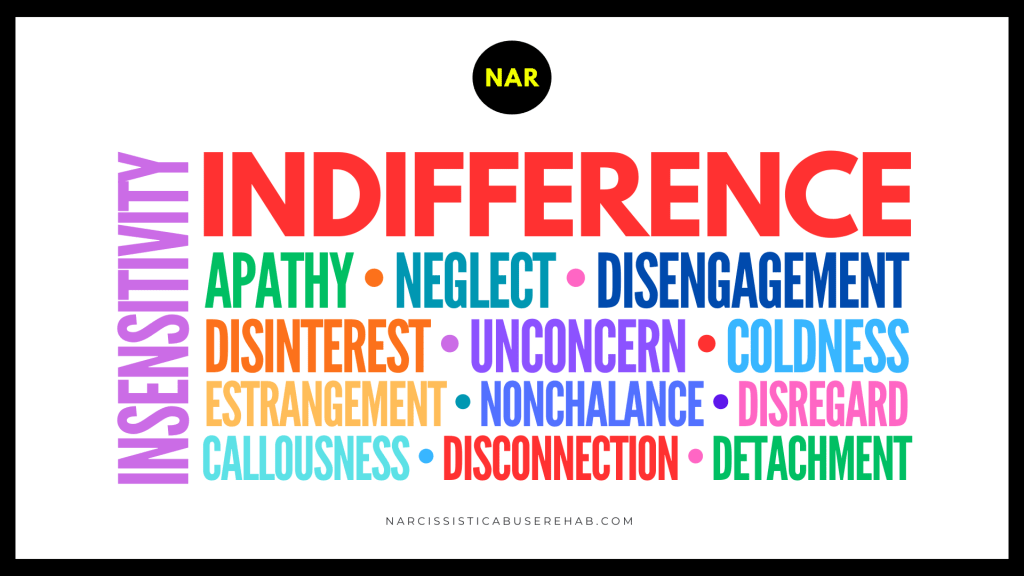The narcissistic abuse cycle often begins with an intense period of love bombing followed by a shift to devaluation. As the relationship deteriorates, the recipient of the abuse often desperately seeks to restore the initial connection, only to be met with increasing coldness and criticism. Indifference then seeps in, marking the final stage before the relationship ends with an inevitable discard.
This article examines indifference as a devaluation tactic in the context of emotional abuse, outlining its indicators and providing guidance on recovering from the erosion of emotional bonds. If you are experiencing indifference our coaching service can help. Book a free consultation to explore strategies that meet your unique needs.
What is Indifference?

Indifference is a state of emotional detachment characterized by a lack of interest or concern. It implies neutrality, without preference or bias. Historically, the term emerged in the mid-15th century from the Latin indifferentia. Its meaning evolved from a sense of impartiality to a more pronounced lack of care.
Indifference is a key contributor to emotional neglect. When someone adopts an indifferent attitude, they withhold emotional engagement, empathy, and support, leaving the other person’s emotional needs unmet.
An ever-increasing pattern of put-downs and negative comparisons often emerges before indifference sets in. It shows up as a decline in interest and emotional investment during the latter part of the devaluation phase of the narcissistic abuse cycle.
Indifference, a passive-aggressive tactic, allows for plausible deniability. When confronted, the victim-survivor is often gaslit and told that nothing is wrong.
A hallmark of narcissistic behavior is the transition from passionate love to indifference, often motivated by the pursuit of validation in a different relationship.
Case Study: How Indifference Can Reveal Emotional Withdrawal In Relationships

Quinn’s anxiety grew as she waited for her husband, Casey, to come home from work. For months, Casey had been late to dinner every night, and she sensed something had shifted in their relationship. Yet, when Quinn asked what was going on, Casey’s responses were marked by nonchalance.
“I’ve noticed that you’re coming home later these days, Casey,” Quinn said gently one evening, “Is everything okay?”
“Everything’s fine,” Casey said breezily, “But, I need to focus on work right now.”
“Of course,” Quinn said, smiling at Casey and noticing that Casey wasn’t smiling back. This prompted Quinn to say, “Are you sure we’re good?”
Casey stared at Quinn flatly and shrugged, “There’s nothing to worry about.”
A fleeting, perfunctory smile barely reached Casey’s eyes, disappearing as quickly as it appeared.
Casey listened with courteous detachment as Quinn recounted her day. Then he mentioned that things were going well at work, and his boss, Morgan, was pleased with his performance. When Casey mentioned Morgan, his eyes lit up, as if he was talking about a superhero.
A troubling pattern had emerged: whenever Quinn shared her thoughts or interests, Casey often redirected the conversation to Morgan. Although Casey was physically present, he seemed emotionally distant—except when the topic of Morgan came up. His tone and demeanor were a stark contrast to the painfully polite indifference he showed Quinn.
In this example, Casey’s indifference towards Quinn is not due to general apathy but rather a specific emotional withdrawal from their relationship, driven by the excitement and validation Casey receives from his connection with Morgan. When Quinn seeks clarity about their relationship, Casey gaslights Quinn into believing that their marriage is stable and healthy, masking Casey’s emotional neglect. This smokescreen conceals Casey’s true intentions as he explores the potential of a relationship with Morgan.
Signs of Relationship Indifference
Recognizing the signs of indifference is crucial for addressing it as your loved one may gaslight you and deny the issue. Remember, people’s true intentions are often revealed through their actions, not their words. Here are some key indicators for indifference:
- Emotional Distance – There is little to no interest in conversations or shared activities.
- Redirected Conversations – Frequent topic shifts during conversations can signal a loss of interest.
- Polite but Distant Interaction – Your loved one’s attitude is courteous but lacks warmth or depth. This is a display of superficial engagement without genuine emotional investment.
- Lack of Physical Intimacy – In intimate partnerships there is a noticeable decline in physical affection.
- Conflict Avoidance – Your loved one uses politeness to deflect from addressing real issues in the relationship and to avoid confronting the increasing emotional distance.
In narcissistic relationships, your loved one may use indifference as a way of bread crumbing you or giving you the bare minimum while exploring other opportunities. If you recognize these signs in your relationship, our coaching services can help you develop effective strategies to determine your next steps.
The Emotional Impact of Relationship Indifference
Indifference is a type of emotional neglect that can evoke a complex array of distressing emotions and false beliefs. Here are some common emotions experienced in response to a loved one’s indifference:
- Confusion – Your loved one’s mixed signals create uncertainty. Their polite detachment leaves you questioning if there’s an underlying problem in the relationship that you can never quite pinpoint. Their insistence that “everything is fine” is in sharp contrast with their actions, creating a mind-bending melée of hope and doubt.
- Sadness – The absence of warmth and connection from a loved one can be deeply painful. You may feel a profound sense of loss for the intimacy once shared. Their indifference can erode self-worth, leaving you feeling undervalued and alone.
- Frustration – Indifference prevents addressing relationship issues, leading to exasperation and an inability to find solutions.
- Insecurity – Self-doubt creeps in as you question your role in the growing emotional distance. Your loved one’s lack of open communication fuels these insecurities. Fears of neglect or replacement arise as their attention seems elsewhere.
- Anger – Indifference can breed resentment. Feeling powerless to change the situation fuels anger toward both your loved one and yourself. Their dismissal of your concerns intensifies frustration.
- Loneliness – You may experience feelings of isolation despite being in a relationship. Your partner’s emotional detachment creates a sense of loneliness. This disconnection undermines the closeness you once shared.
- Hopelessness – Persistent indifference erodes hope for the relationship’s future. Without resolution, emotional detachment can lead to despair.
- Intrusive Thoughts – People experiencing indifference often engage in rumination or even obsession, fixating on the incongruity between their loved one’s polite demeanor and their harmful behavior.
A loved one’s indifference can damage the foundation of a relationship by undermining trust, causing deep emotional pain, and creating a sense of betrayal.
“I don’t think I’ve ever felt so low. It was as if nothing I did mattered–as if I didn’t matter. I was constantly anxious until I understood why my partner was being indifferent. Discovering the truth was painful but also liberating.”
Rosalyn
Self-Doubt and Relationship Indifference: Common Negative Thought Patterns
Indifference from a loved one can be devastating because the victim-survivor is plunged into emotional limbo. Investing deeply in a relationship, only to be met with detachment, can significantly damage self-esteem. The emotional impact of indifference can manifest as recurring thoughts that undermine the survivor’s self-esteem, leading to feelings of inadequacy and worthlessness.
Some examples of the recurring thoughts they may have are:
- “I’m not enough.”
- “I’m undesirable.”
- “I’m worthless.”
- “I’m boring and uninteresting.”
- “I’m not important.”
- “Others are better than me.”
- “I’m unloveable.”
- “I’m unworthy of love of care.”
- “I have no value.”
- “I’m nobody.”
- “I’m nothing.”
Prolonged exposure to indifference can cause significant psychological and emotional distress in the victim-survivor, leading to these recurring thoughts. When someone is consistently ignored or overlooked, they can feel excluded from their loved one’s life.
“I entered the relationship feeling confident and secure. When my partner’s indifference grew, I desperately tried to improve myself. Their emotional disengagement was due to their interest in someone else, which I didn’t know at the time. All I knew what that I came to believe I was inadequate. I kept thinking, over and over, ‘I’m nobody at all. I’m nothing,’ because that’s how I was treated.”
Eric
What to Do About It
While emotional neglect can often be addressed in healthy relationships, it can escalate in narcissistic partnerships. Recognizing the dynamics at play is crucial for determining appropriate next steps.
- Self-reflection – Have you used people pleasing responses to your loved one’s indifference? Have you looked the other way to keep the peace? Do you suppress your emotional needs to avoid conflict? Have you prioritized your loved one’s needs over your own? Have you set and maintained healthy boundaries? These behaviors allow a loved one’s indifference to go unchecked.
- Be observant: Look for recurring patterns of behavior in your loved one. Does their behavior run hot then cold? Are they dismissive one moment, then giving you hope for reconnection the next? Recognize signs of gaslighting or control. These behaviors are often typical of emotional manipulation.
- Assess the relationship history: When you reflect on the relationship’s trajectory. Has there been a significant shift in dynamics from reciprocal to one-sided? Has there been a change in the style of communication?
- Seek external perspectives: Discuss your concerns about your relationship with trusted friends, family members, or a recovery coach. This can help you gain perspective about your situation.
- Trust your instincts: Your gut feelings about the situation plays a vital role. Pay close attention to your emotional responses and intuition.
“Indifference is like a road block that keeps you stuck, confused, and not knowing what to do. Once I understood what was happening to me, I could make informed decisions about my future. It changed everything.”
Lisa
When to Consider Letting Go
Not all relationships can be saved, especially when a once reciprocal bond becomes one-sided due to one partner’s emotional detachment. Repeated rejection of your attempts to reconnect can erode self-worth and create a toxic cycle. When this happens it’s time to evaluate whether to move on and establish a more fulfilling arrangement.
Questions to Consider:
- Are you and your loved one committed to working on the relationship?
- Is your loved one’s indifference temporary, or has it become part of a persistent pattern of emotional neglect?
- Can you imagine a future where emotional connection and engagement are successfully restored?
These questions can guide you in deciding whether to continue investing in the relationship or ending it so that you can invest your time and energy in more fulfilling pursuits. For professional guidance in making this decision, our coaching services can offer valuable insights and support.
Conclusion
In narcissistic relationships the smoke of indifference is an insidious yet powerful form of neglect. Narcissistic people, driven by their own needs for validation and control, are prone to disengage emotionally, leaving those who love them feeling unseen, unheard, and marginalized. Their emotional detachment often serves to mask deeper issues, allowing people with narcissistic traits to avoid accountability as they subtly manipulating the dynamics of the relationship.
Recognizing signs of a loved one’s indifference is the first step to reclaiming your self-worth. Whether it shows up as polite indifference or outright disengagement, indifference is a tactic used to exert control. Once you recognize the pattern, it’s possible to take an objective view of the situation and decided on your next steps.
If you are experiencing indifference from a loved one and need support to navigate its complexities book a free consultation to explore recovery strategies.
Quotes on Indifference
Resources
Images by Deposit Photos, Pexels, and Narcissistic Abuse Rehab.

